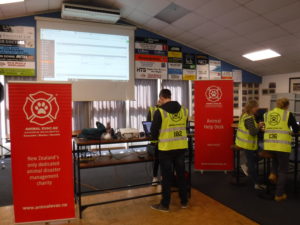
Animal Evac NZ made history today, with supporting the first co-located (human and animal) emergency shelter exercise that tested a local animal emergency management site-specific plan developed by a local authority in New Zealand. The site specific plan will be revised from the debrief feedback and will provide an excellent template for others to follow.
Congratulations to Mark Farrar and Jenny Rains from Wellington City Council for their leadership on this important matter. The venue hosts Johnsonville Rugby Football Club were fantastic! We even had Jonathan Hooker from the Wairarapa (WREMO) come and observe, as well as other staff from Wellington City Council.
The exercise has been months in the making and brought together world leading research to inform how it would operate, including adopting procedures set by other world experts like Dr Dick Green who also promote the concept of co-located shelters, where animal owners maintain responsibility for the care of their animals following an evacuation.
Sometimes emergency animal shelters are designated in emergency plans, but seldom are detailed site-specific plans developed and then tested in an exercise. This along with the asoption of co-location doctrine and integration of D4H, it made the exercise unique in the history of New Zealand.
The exercise was a pilot project so it was kept small, but next step for Animal Evac NZ is working with Welllington City Council to ensure as many other animal groups and businesses in the area are engaged (big and small) are part of the planning process, should they want to help in future disasters.
“It is important for any organisation wanting to help respond to emergencies that they engage, collaborate, train and exercise before the emergency strikes to ensure the processes and systems are optimal to avoid conflict and prevent animal welfare being compromised” says exercise facilitator Steve Glassey.
“We got to deploy D4H – Readiness & Response Incident Manager which proved an effective real-time tool to share information securely, a platform we make available for our response partners to ensure all organisations are sharing information which leads to better animal welfare outcomes during disasters”.
Thanks to all our Wellington volunteers who gave up their afternoon to make this historical event a success.